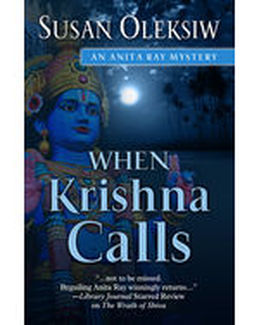|
8/15/2016 0 Comments Susan Oleksiw: When Krishna Calls My guest today is Five Star author Susan Oleksiw, author of When Krishna Calls. Susan shares insight gained from living in India, which is woven into an intriguing story line. And what a terrific cover! It’s easy to be nostalgic for the past because we can make the past whatever we want it to be. In reality, even the period thirty years ago was a lot less wonderful than we like to think, but I’m glad I went to India before it began to change and became easier for foreigners. In 1976, I took my first trip to India with no cell phone and no ATM card. I had fifteen dollars in my pocket and the promise of being met by the director of the foundation funding my research. Life is a lot easier now, but new visitors to India will miss a lot. A professor I planned to work with suggested I rent a hotel room and work from there. After all, what did I need with a house? It was so much unnecessary work. He had a point, but I didn’t want to live in a hotel and eat in restaurants for a year. I rented a house, hired a maidservant (everyone has at least one maidservant, even those who are maidservants), and settled in. One of the first lessons I learned is, everyone in India is in debt. We talk about debt in the United States as a terrible burden (for someone in the middle class) or a moneymaking opportunity (for others higher up). In India, it’s a form of public service—debt keeps money circulating through a community, ties one small shop owner to his customers, and ensures that everyone gets to participate in the essential aspects of life, such as an expensive marriage or a special math tutor or a journey to a holy site. My first experience with it came through our maidservant. She had a friend in trouble who wanted to pawn her ration book (a very common way of raising funds). I declined, but over the coming months I loaned numerous small sums that I never expected to see again, making my contribution to the underground economy. But there is a dark side to this hidden world, one that ensnares families for generations. This is the subject of the new Anita Ray mystery. When Krishna Calls explores the desperation that engulfs both lender and borrower in the circumscribed world of village life when one young man is determined to break out. When he’s killed, his wife faces the same trap and the same trappers. Anita sets out to help her, and she finds that she too is caught in the same meshes. I thought I knew a lot about the world of small-scale debt when I began the book, but I learned a lot as I went along. India is home to many unusual practices, and one in particular is familiar to Westerners. The practice of benaami, by which an expensive property is put in the hands of someone who isn’t subject to tax, a straw owner, has been pervasive. The government has tried to stamp it out by enacting a law that states any benaami owner can lay claim to the property and be considered the full, legal owner, regardless of how he or she came to have a name on the deed. This sounds wonderful. But it overlooks just how unscrupulous the real owners can be. No one’s going to let property worth millions of rupees (or dollars) slip away. Anita Ray struggles with saving Nisha, a part-time employee, and her aunt’s tourist hotel. But she also struggles with meeting deadlines for an important photography exhibit in a prestigious gallery. In this book, she has her hands full, but she is always capable.  When Krishna Calls: An Anita Ray Mystery (Five Star/Gale, Cengage, 2016), available August 17. You can learn more about Susan and her work at http://www.susanoleksiw.com/
0 Comments
Your comment will be posted after it is approved.
Leave a Reply. |
Subscribe to this blog: |
Proudly powered by Weebly
 RSS Feed
RSS Feed